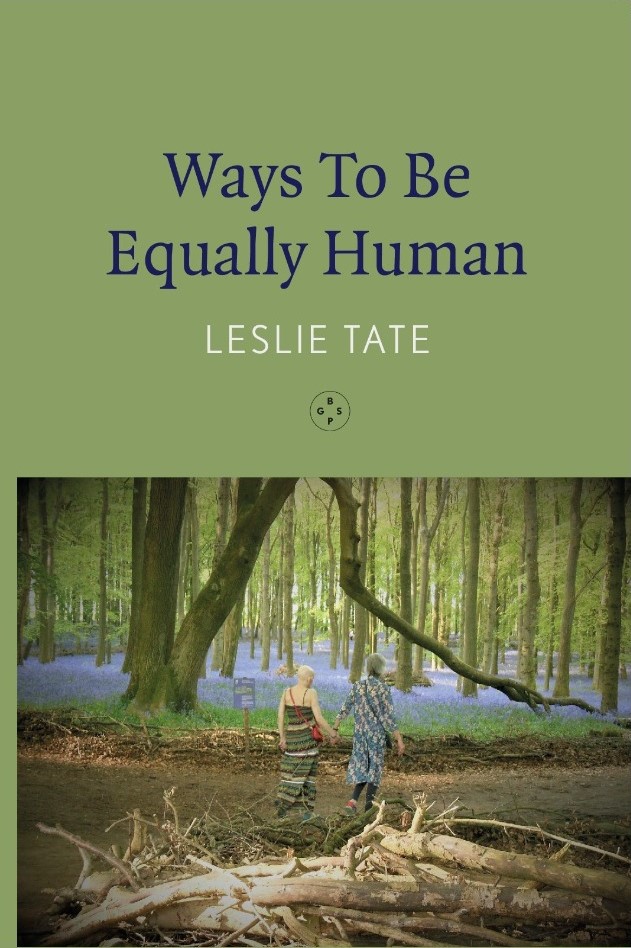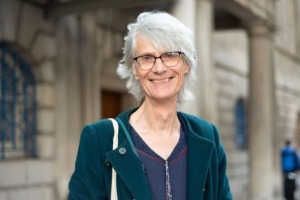
It’s my pleasure to welcome back Leslie Tate to Linda’s Book Bag today. Leslie has been a huge supporter of the blog over the years and has featured here.
Today Leslie provides a thought provoking guest post to celebrate the release of his latest book Ways To Be Equally Human.
Published on 20th May 2024, Ways To Be Equally Human is available for purchase as a signed copy from Leslie’s website, or from The Black Spring Press here.
Ways To Be Equally Human
In Ways To Be Equally Human Leslie Tate tells the inside story of coming out as a non-binary person, from being ‘othered’ in gendered toilets to stepping up on stage & radio and taking action with Extinction Rebellion.
Leslie’s poetic life-fiction takes us on a journey through crazy childhood dreams and gender dysphoria into personal growth. Full of lyrical writing, humour and quirky insights, this is a book for lovers of language, nonconformists and passionate thinkers. It’s a clear-eyed account of how we live today, including computer stress, noisy neighbours, guided meditation and the spirit of rebellion inside the machine.
Ways To Be Equally Human is also a love hymn to Leslie’s partner and the planet.
WHO’S HIDING BEHIND THAT BOOK?
A Guest Post by Leslie Tate
Behind every book there’s an author like me with a story. Sometimes it’s about finding a first-line hook or unique selling point (helped by agents & publishers); at other times it’s the outcome of a creative writing course, or a thesis, or it’s written in a month with NaNoWriMo; sometimes in a few high-profile cases, it follows the money (with goods and merchandise and spinoffs); but in my case, Ways To Be Equally Human wasn’t written to grab C1readers, chase fame or get adapted for TV. (Quick disclaimer: writing best sellers takes a lot of time and skill, it’s just not for me.)
If you want a 16-wordsummary of Ways To Be Equally Human, it’s a ‘no-holds-barred psychological investigation into gender and XRactivism using poetic realism, lyrical essays and behind-the-mask stories’. But in case you’re looking for something shorter and punchier, how about: ‘get down with this must-read book from a 75-year-old member of Gen Z!’. Blurb-writing, of course, is part of the indie author’s toolkit.
So, is it just a book for literary types? And what’s in it for me, you ask? To give you a flavour, here’s pp.22-24 from the Extinction Rebellion section:
“What are you, man or woman…?”
It was Friday lunchtime and I was with a group outside Barclays speaking to people about fossil fuels. We’d been inside, acted a die-in, filled the pavement with bodies and placards and been taped off by the police. It looked like a crime scene. Now we were preparing for part two of our protest.
The question – or statement – came from a young overweight spectator-man standing at the front of the crowd. He was staring at me with a dirty grin. I could picture him ogling girls and winding up kids at school
Behind me, two demonstrators, one male, one female, were kneeling in front of a large black-and-white sign. They were getting ready.
My answer popped out without thinking. “Neither.”
Part of me had always considered myself male, softened by the non-binary label, but to be neither took it further. I’d become myself, a resister picked out by my difference. I could hear in my mind the words of Where the Streets Have No Name.
It had happened before. I’d been called a lady – sarcastically, aimed from behind – whistled and shouted at, and once, kerb crawled while shopping. Being catcalled was no surprise and the man in the van was a Bluto-type, but it took some getting used to. It was a lesson in what women had to put up with.
“Wha’ the fuck,” my spectator-man said.
In my head, I completed his phrase with …are you?
A thin woman in a red top stepped up to the kneeling demonstrators. She was holding a bottle of thick, dark liquid.
“Climate breakdown,” I called. “This bank funds it.”
I stared at the man. With his bristly chin and leery expression, he was acting a part. I could see him in later life, leaning on a bar and swearing at women on TV.
“Crazy,” he said, screwing one finger into his temple.
Behind me, the woman had raised her bottle to head height. As the spectator-man glared, my thoughts flashed back to a bully at school. It was all about swagger and overstated gesture. There was nothing underneath.
“F… F… bank,” the woman called, anointing the protestor’s head.
As the liquid oozed across flesh, the spectator-man laughed. “Weird,” he shouted, waving one arm. “Weirdo man. Weirdo people.” Choosing his moment, he began to walk away.
“No. Beautiful,” I said, as the liquid spread like gravy. “But also… not beautiful,” I called as it hardened to a crust. “Neither, really,” I added. “Just human and wanting to live.” In my mind I heard the phrase That’s why I’m here.
His question had been answered.
And the story behind that? I poured the oil onto my wife’s head, a crowd gathered and some of them were rude, I was wearing a dress and leggings but no one questioned my gender. The other experience that found its way into the piece was being picked on at school. As a repeat theme in Ways To Be Equally Human, it’s both seminal and formative. It’s also part of the book’s ‘inside report’ on masculinity.
Here’s one example, taken from p.104:
The old one-two
I
Class 5C were playing in the rain.
As they kicked and went down,
they shouted, calling it a dirty match.
Someone got stomped on. With the wind against them
they threw up their arms and yelled PENALTY.
Being 5C they were famous.
So who were their heroes and what did they stand for?
As squaddies they were on target.
As escaped POWs they hit the ground running.
As the team out of hell they took route one.
Between runs they held their sides and scowled.
What did they say, splashing through mud?
Ref. Replay. Wrong. Fix. Offside. Foul. Unfair.
Mostly, they just floundered.
At half time, changing ends,
they dragged their feet as if they’d been wounded.
The rain had filled their boots.
And their names?
Baggy, Messy, Clever Clogs, Chop Chop,
Fidget, Burper, Dodger, Pimple,
Big Foot, Fixer and Lout.
II
All that summer the boy at the back had dreamed
of being in charge.
He’d be the cannonball striker who scored
with a high-dive backflip somersault.
Later he blocked all shots
by turning his body into a No Entry sign.
He was the comeback kid who wore the armband
as bully repellent.
Turned Pied Piper, he drew off the other side’s defenders.
And when he launched his tackles
he became the spade that dug up gold.
Afterwards, his legend lived on.
Nicknamed Long Shot, he was in the air
nodding in the equaliser when the ground
came up and hit him.
He missed. Nobody cheered.
As for class 5C: when the final whistle blew
they quick-marched him to the changing rooms
where they all piled in with penalties
while grinning madly
as if their lives depended on it
I’ll end this blog with a confession. You may have noticed that I still haven’t told you the hidden story behind the book. That’s because it’s complex but in its own way simple. So, it’s written in different styles as a series of linked stories & reports, all of them taken from those watershed moments in life, dealing with transformations and metaphors of growth and resistance. On the way, it explores wild childhood fantasies, the highs and lows of coming out, performance anxiety on stage and radio, modern lifestyles, and the inside story of climate rebellion. But what drives the book are the personal fears of my life and others, set against the bigger picture. Or to put it another way, taken from p.192:
In writing, time slows down at the climactic moments. We’ve worked so hard to reach this point we want it to go on. And as we pause at the top, the aim is to see the big picture. That can be through the ripple effect: to maximise an incident and follow what comes next; or it can be through selective focus – a single garment or a closeup from a view – and the rest is for the reader to fill in.
And, however you use them, words are definers. They pinpoint the world. So the task is to hint at something wider while nailing things down. The generic singular. And the flow? That comes with the voice – the stops and starts and sounds that merge; the up and down signals; the own way of putting it.
****
As always, Leslie, it’s a pleasure to read your writing and to note the humanity behind everything that you do. Thank you for sharing this with us. (And apologies that my formatting didn’t do proper justice to your poetry!)
About Leslie Tate
Leslie Tate is a non-binary author and University of East Anglia graduate who interviews creative and community-active people weekly on radio and in writing at https://leslietate.com. Leslie played the lead role in Heaven’s Rage, a film that was screened at 34 international film festivals. Leslie hosts Extinction Rebellion stages, has been shortlisted for the Bridport, Geoff Stevens and Wivenhoe poetry prizes, was British under 21s Chess Champion and is a Quaker. Ways To Be Equally Human is Leslie’s fourth novel.
For further information about Leslie, visit his website, find him on Instagram and Facebook and follow him on Twitter/X @LSTateAuthor.
Discover more from reviewer4you.com
Subscribe to get the latest posts to your email.







